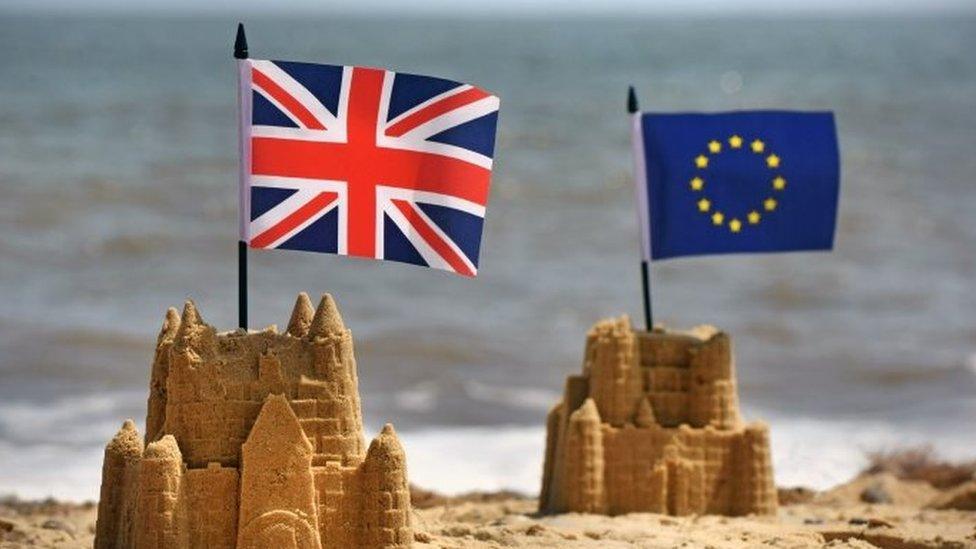Brexit: the response in Wales so far
- Published

So how should the Welsh political parties respond to Brexit? This question is going to occupy minds for some time to come.
The Brexit vote was a major problem for the first minister on a number of different levels. Most obviously, he failed to persuade voters to support his arguments in a referendum with a huge turnout regarding the biggest decision in a generation. He is not alone in this, the prime minister and the Welsh secretary can count themselves members of that club as well.
So he has been left in the position where he has to reflect a view which he has fundamentally opposed.
Two major concessions have been made to the Brexiteers in Wales: first to dismiss any notion that there should be a second referendum, and secondly to accept that the unrestricted free movement of people has to be changed.
This was at the heart of the Welsh government's decision this week in a debate on the EU at the Senedd to support a Conservative amendment supporting access to the single market, rather than a Plaid motion on membership of the single market.
Immigration
The Welsh Government line is that continued membership of the single market would be to ignore the result, and a major concern of Welsh voters regarding immigration.
One of the big problems Carwyn Jones faces is making tariff-free access to the single market a red line while also acknowledging that the unrestricted movement of people has to change as well.
As many have pointed out, including European leaders, these are irreconcilable differences.
The other problem is the choice of language the first minister uses, particularly when he talks about the deeply damaging impact tariffs would have on manufacturing.
No-one knows for certain but at this point in time you have to say there is a good chance that tariffs will be introduced and the question is whether the first minister, who in effect acts as Wales' most high-profile salesman around the world on trade missions, should be more positive about all the eventualities.
Leverage
And then there is the entire question about whether any of this matters? In other words, has Carwyn Jones got any leverage with Theresa May when she knows most voters in Wales want to leave.
The UK government says it will engage with the devolved nations but behind the scenes the Welsh Government's fear is that the Treasury, in particular, will pay lip service to that commitment.
The Welsh Secretary Alun Cairns insists that will not be the case but his challenge will be persuading sceptics that UK ministers will listen to concerns from Cardiff Bay.
For what it is worth, I am told that relations between the new UK government and the Welsh administration have got off to a good start.
Plaid Cymru has made the Brexit response a central theme since the result.
Access
The consistent line of attack on the first minister is that he has flip-flopped on the issue, pointing to his initial call for Brexit to happen quickly, and then saying it should wait until next year, and his response to a question from Leanne Wood in First Minister's Questions that Wales should remain a member of the single market when he is now saying it is access, rather than membership, which is important.
Changes that were made to the very first press release on the response have also played into Plaid hands.
The party's basic point is that the first minister should have come out with a far more detailed and comprehensive description of the kind of Brexit he wants to see, instead what we have had is one big red line on tariff-free trade, and broad flexibility on many other issues.
Plaid's Shadow Economy Secretary Adam Price says Labour's refusal to support retaining single market membership is the biggest thing to have happened since the start of devolution.
There will be plenty who disagree with that but the fact that he has spoken of it in those terms shows the importance he has given it.
Bespoke
There are two problems for Plaid. The first is dealing with the inevitable accusation that it is in denial about the result in Wales, and the clear desire of many people to do something about immigration.
The second is that it is focusing on the variety of off-the-shelf versions of Brexit when Theresa May has already said she will be looking to pursue a bespoke deal. In other words, it is playing by a different set of rules to the person who is going to be making the big decisions.
But the party has been consistent in saying that the Welsh Government needs to get its specific wish-list on Brexit onto the prime minister's in-tray early, and there are no signs of any let up.
The Welsh Conservative leader Andrew RT Davies is also looking to define himself on Brexit, but from the opposite direction.
His thrust is to keep the government honest in representing the 52% in Wales who wanted to leave, and has been particularly critical of attempts by the first minister to lump in warnings about constitutional change in the UK.
He has also called for greater consistency from the Welsh Government, but the problem he faces is pursuing that line when it is clearly a work-in-progress from the Conservative UK government.
Unsurprisingly, UKIP is able to have the most straightforward approach. Like the Tories, Neil Hamilton has a particular issue with the negative tone surrounding Brexit.
He described the first minister as a "miserabilist" because the opening page of this week's Welsh programme for government said: "Every objective analysis of the potential impact of Brexit says we should be prepared for a shrinking economy."
Theresa May has been quoted talking about the dangers to her government of being consumed by Brexit, it could turn out to be a danger for the Welsh Government as well.